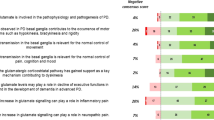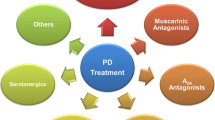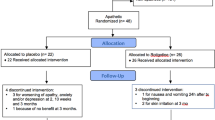Abstract
THE symptomatic treatment of Parkinson's disease usually involves anti-acetylcholine drugs which may block muscarinic receptor sites on neurones in the reticular formation. Unfortunately, all of the drugs in common use have pronounced peripheral anti-acetylcholine actions which result in unpleasant side effects, such as dryness of the mouth and mydriasis.
This is a preview of subscription content, access via your institution
Access options
Subscribe to this journal
Receive 51 print issues and online access
$199.00 per year
only $3.90 per issue
Buy this article
- Purchase on Springer Link
- Instant access to full article PDF
Prices may be subject to local taxes which are calculated during checkout
Similar content being viewed by others
References
Doyle, F. P., Mehta, M. D., Ward, R., Bainbridge, J., and Brown, D. M., J. Med. Chem., 8, 571 (1965).
Brit. Pat. Specification 1,007,845 (October 10, 1965).
Everett, G. M., Blockus, L. E., and Shepperd, I. M., Science, 124, 79 (1956).
Kocsis, J. J., and Welch, L. M., Pharmacologist, 2, 87 (1960).
Author information
Authors and Affiliations
Rights and permissions
About this article
Cite this article
BROWN, D., HUGHES, B. & MEHTA, M. BRL 1288—a New Anti-Parkinson Drug. Nature 223, 416–417 (1969). https://doi.org/10.1038/223416a0
Received:
Revised:
Issue Date:
DOI: https://doi.org/10.1038/223416a0
Comments
By submitting a comment you agree to abide by our Terms and Community Guidelines. If you find something abusive or that does not comply with our terms or guidelines please flag it as inappropriate.



